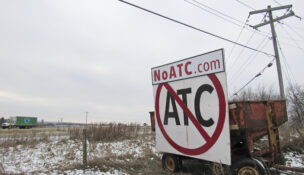Bar deals with lost investment income
By: dmc-admin//February 9, 2009//
In an effort to compensate for a growing gap in investment returns, the State Bar of Wisconsin may have to tighten its belt heading into the next fiscal year.
Finance Committee Chair William J. Domina said he expects to erase a $43,000 budget deficit by the end of this fiscal year, primarily by holding costs in yet-to-be-determined areas and drawing from a $42,000 emergency fund.
But after fiscal year 2009 ends on June 30, Domina said “tougher decisions” will have to be made given that long-term and intermediate investments are not expected to rebound anytime soon.
“In terms of personnel, there is not a need to talk about eliminating or holding of positions, but some programs and expenses like training costs could be subject to review,” Domina said.
“We may look at where we have expense duplications and have to be brighter about how we manage our time and assets,” Domina said. “But throughout the years the bar has been incredibly well run, so I think we’re better off than a lot of other businesses.”
Growing Gap
A report given to the Finance Committee board on Jan. 30 by its investment manager from M&I Bank indicated that accounts could continue to slide for at least the next 12 months.
As of Oct. 31, 2008 returns on intermediate and long-term accounts had decreased 1.9 percent and 16.5 percent, respectively. Domina said the State Bar had budgeted for a $123,000 gain in FY 2009, but instead had endured a $231,000 loss on the investment side.
Through the end of 2008, Domina estimated that the investment losses had grown to approximately $300,000.
“The feeling is that the bar will go forward on all its commitments at this point,” said Domina, who did not anticipate shifting money from programs funded by the current budget.
The State Bar has partially offset the investment losses with revenue generated by a new payment option for continuing legal education seminars. The bar created an Ultimate Pass, allowing lawyers to pay an annual fee for unlimited access to CLE programs.
Domina added that any “substantive” discussion about which expenditures may be reviewed going forward will begin in March after the next Board of Governors meeting on Feb. 27. The Finance Commit-tee is scheduled to present its annual budget to the board on May 6 and final approval is scheduled for June 26.
Members of the Finance Committee will work with the bar’s Strategic Planning Committee to determine which areas will be reviewed, and potentially subject to revisions.
“We’ll look hard at how things rank and funding,” Domina said. “We may have to make some tougher choices.”
Positive Reinforcement
Despite the six-figure budget gap created by slumping investments, the overall deficit is “manageable” according to Domina, thanks in part to the success of the bar’s Ultimate Pass CLE Program.
The program launched on Aug. 19 and, according to CLE Director Bill Connors, enrollment has more than doubled expectations. As of Feb. 3, Connors said that 867 attorneys are enrolled in the program, which allows attorneys unlimited access to CLE seminars.
At $595 per pass, more than $515,000 in revenue has been generated by the program in its first six months.
“We were hoping for about 400 [enrollments] in the first year and because it was rolled out in short order during the budget year, there were not any projections,” Connors said.
He expects that the number of attorneys who join will continue to climb through 2009, because Dec. 31 will be the end of the two-year CLE reporting cycle.
“We obtained the majority of seminar revenue in the first half of the fiscal year, because the reporting period ends midway through the fiscal year,” Connors said. “So we expect a lot of new sales of the Ultimate Passes in the first half of fiscal year 2010.” But while the program is providing an immediate boost to the bar’s bottom line, it may only be temporary unless renewal numbers are strong. Cost to renew an Ultimate Pass is $425.
Both Domina and Connors expect the program to remain profitable once attorneys are eligible to renew in August, but they also admit there is a risk.
“Many of the people who buy the Ultimate Pass have a history of attending and paying for seminars a la carte, so they are getting a tremendous deal,” said Connors, who noted that individual day-long CLE sessions can cost $199.
“So the revenue we’re getting from them is less than what we would be getting per seminar,” Connors said.
He said the key will be retaining members who purchased the Ultimate Pass, but historically only attended one or two seminars every reporting cycle.
Without them, there could be a drop in revenue which will impact the 2011 budget, said Connors.
“We’ll be watching the renewal rates and getting the majority from people who haven’t typically attended a lot of seminars will do a great deal to stabilize our revenue situation,” Connors said.
Legal News
- Applicants wanted for Jefferson County, Crawford County circuit courts
- Wisconsin wedding barns sue over state’s new liquor law requiring licensing
- Audit launched of Wisconsin’s diversity efforts
- Federal appeals court approves high-voltage power line through Mississippi River refuge
- Dane County residents encouraged to weigh how to spend federal funds
- Jurors should have considered stand-your-ground defense in sawed-off shotgun killing, judges rule
- Money isn’t enough to smooth the path for Republican candidates hoping to retake the Senate
- Milwaukee election leader ousted 6 months before election in presidential swing state
- Former President Trump calls for arrest of special prosecutor Jack Smith
- Wisconsin judge dismisses lawsuit challenging state’s new wolf management plan
- Wisconsin Supreme Court issues opinion on Milwaukee Police officer fired over Facebook posts
- Gov. Evers Seeks applicants for Menominee County Register of Deeds
WLJ People
- Power 30 Personal Injury Attorneys – Russell Nicolet
- Power 30 Personal Injury Attorneys – Benjamin Nicolet
- Power 30 Personal Injury Attorneys – Dustin T. Woehl
- Power 30 Personal Injury Attorneys – Katherine Metzger
- Power 30 Personal Injury Attorneys – Joseph Ryan
- Power 30 Personal Injury Attorneys – James M. Ryan
- Power 30 Personal Injury Attorneys – Dana Wachs
- Power 30 Personal Injury Attorneys – Mark L. Thomsen
- Power 30 Personal Injury Attorneys – Matthew Lein
- Power 30 Personal Injury Attorneys – Jeffrey A. Pitman
- Power 30 Personal Injury Attorneys – William Pemberton
- Power 30 Personal Injury Attorneys – Howard S. Sicula










